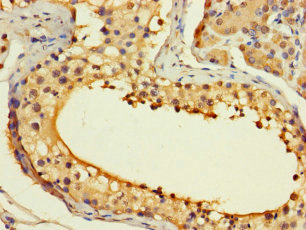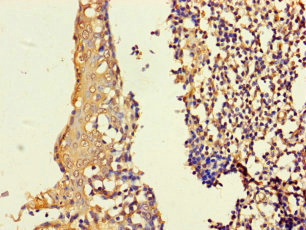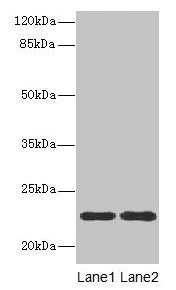Full Product Name
Rabbit anti-Homo sapiens (Human) ASF1B Polyclonal antibody
Alternative Names
Anti silencing function 1B antibody; Anti silencing function 1B histone chaperone antibody; Anti-silencing function protein 1 homolog B antibody; ASF1 anti silencing function 1 homolog B (S. cerevisiae) antibody; ASF1 anti silencing function 1 homolog B antibody; ASF1B antibody; ASF1B_HUMAN antibody; CCG1 interacting factor A II antibody; CCG1-interacting factor A-II antibody; CIA-II antibody; hAsf1 antibody; hAsf1b antibody; hCIA-II antibody; Histone chaperone ASF1B antibody
Immunogen
Recombinant Human Histone chaperone ASF1B protein (1-202AA)
Immunogen Species
Homo sapiens (Human)
Conjugate
Non-conjugated
The ASF1B Antibody (Product code: CSB-PA878898LA01HU) is Non-conjugated. For ASF1B Antibody with conjugates, please check the following table.
Available Conjugates
| Conjugate |
Product Code |
Product Name |
Application |
| HRP |
CSB-PA878898LB01HU |
ASF1B Antibody, HRP conjugated |
ELISA |
| FITC |
CSB-PA878898LC01HU |
ASF1B Antibody, FITC conjugated |
|
| Biotin |
CSB-PA878898LD01HU |
ASF1B Antibody, Biotin conjugated |
ELISA |
Purification Method
>95%, Protein G purified
Concentration
It differs from different batches. Please contact us to confirm it.
Buffer
Preservative: 0.03% Proclin 300
Constituents: 50% Glycerol, 0.01M PBS, PH 7.4
Tested Applications
ELISA, WB, IHC
Recommended Dilution
| Application |
Recommended Dilution |
| WB |
1:1000-1:5000 |
| IHC |
1:20-1:200 |
Storage
Upon receipt, store at -20°C or -80°C. Avoid repeated freeze.
Lead Time
Basically, we can dispatch the products out in 1-3 working days after receiving your orders. Delivery time maybe differs from different purchasing way or location, please kindly consult your local distributors for specific delivery time.
Description
The ASF1B antibody is prepared by immunizing rabbits with the recombinant human Histone chaperone ASF1B protein (1-202AA) and by purifying rabbit antiserum by protein G. It is a polyclonal antibody and exists an unconjugated IgG. Protein G purified ASF1B antibody reaches up to 95% in purity. It is only reactive with human ASF1B protein, which is limited to proliferating tissue and is greatly reduced in terminally differentiated and quiescent cells. The ASF1B protein is involved in cell proliferation. This ASF1B antibody is suitable for the detection of ELISA, WB, and IHC applications.
Usage
For Research Use Only. Not for use in diagnostic or therapeutic procedures.









